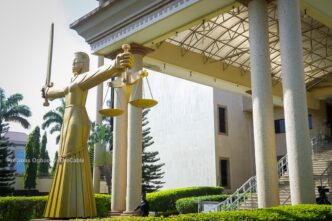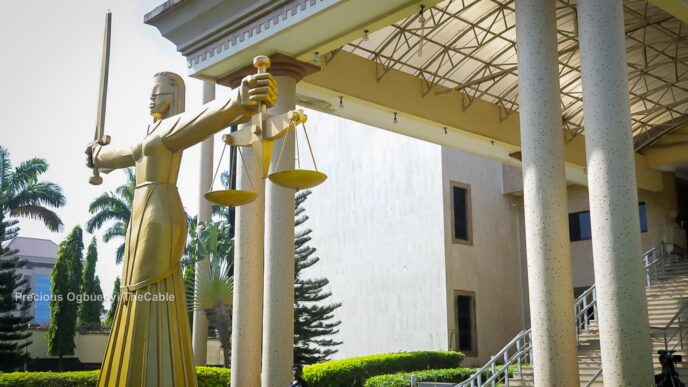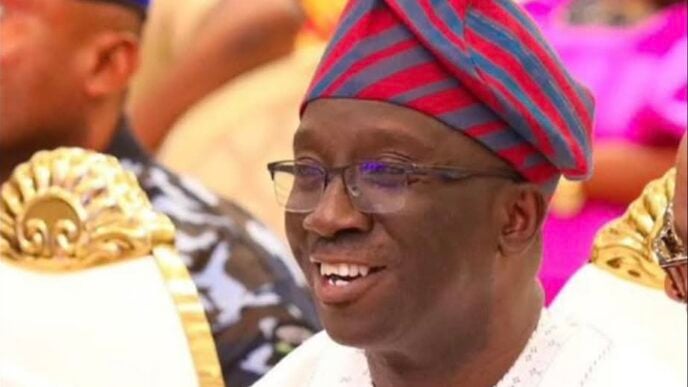BY FIDELIS NWAGWU
In the politically charged maelstrom that Nigeria has become, issues which ordinarily ought to have been rested by very straightforward points of law, if not commonsense, now rather get refracted through different echo chambers – some of which are fouled – and become magnified and many times infused with very negative – if not toxic – energies, to assume shapes and forms that makes them almost unrecognisable from the originating subjects. These then become very serious and volatile issues in the realm of public opinion.
We routinely witness many of these issues that become overamplified out of the ordinary in the course of our daily national experience. These could be largely ascribed to a general era of discontent, in which many no longer subscribe to shared perspectives, or a sense of group identity or community, with many things seeming to divide instead of drawing us together. In this context in which divisiveness is so pervasive, many malcontents find ammunition in issues that do not serve their personal or group interests to further drive-in wedges that tears us apart.
One issue that has occupied and appears to have taken over the echo chambers for longer than usual and is indicative of our present discontent with government, public institutions and personalities – which might possibly still be a fallout of the bitterness of the last elections – is that of the tenure of the Inspector-General of Police.
Presently, we are witnessing a series of social actors and those within the security sector, who are expressing very strong opinions about the desirability or the lack of it, of the continued stay in office of the Inspector-General of Police. Some of their arguments could be emotive, touching on concerns around stagnancy at the hierarchical level of the force, and how this might affect morale of senior level cadres, with ramifications for effective policing.
Advertisement
Yet, the fact remains that what is being construed as a major issue – as driven by self-interest – by some at the hierarchical level of policing, also speaks to the critical challenge that the nature of leadership tenure has imposed on the efficacy of Policing. With numerous Police IGPs not spending up to a year in office, this poses severe hinderances to the proper implementation of their different policies and designs to enhance national security. This is what the recent amendment to the Police Act by the National Assembly seems to have taken into consideration by securing a fixed tenure of four years for anyone appointed into the role of IGP.
The Echo Chambers
Two very significant factors appear to be at play in heating up the polity and causing the degree of noise we are experiencing, in relation to the tenure of the Inspector-General of Police (IGP). And, as alluded to, these appear driven by parties with various levels of interest, in either seeking for their candidates to be elevated to the post of the IGP, or just in order to create public disaffection for the government of the day.
Advertisement
The first pertains to those who are seeking to weaponise the recent declaration and statement of the Police Service Commission, which is appealing to the provisions of the Police Act, in its Section 18, to mount pressure that all police officials – across all ranks – are subjected to the ‘extant’ law on tenureship, which stipulates that after 35 years in service or on the attainment of the age of 60, every Police officer should statutorily be eased out of service.
Second, there have been the very contentious opinions raised by a number of activists, prominent among who is the publisher and politician Omoyele Sowore, who very controversially claimed that what we have is an illegal IGP, who is occupying his office illegally and unconstitutionally. This is a very serious allegation that seeks to impugn the credibility of the office of the IGP, and has serious implications for the enforcement aspect of the administration of justice in the country. Moreso, it seeks to put the institution on trial in the court of public opinion.
However, the position of Sowore and his ilk could be considered as essentially an opinion, particularly when juxtaposed against the provisions of the law, which would point to the facts of the situation. It goes without saying that whereas everyone has a right to or is entitled to their opinions, these could be largely subjective and might not be exactly the true situation of things or the truth. Hence, to put it mildly, opinions are highly personal, while facts are sacrosanct.
The Legal Regime of IGP Tenure
Advertisement
As such, this leads to consideration of what are exactly the facts of the matter, in relation to the proper or improper occupation of the office of the IGP by Mr Egbetokun? Could he be said to be engaged in an act of illegality by continuing in office, having passed the statutory age of 60, at which most public servants are expected to be eased out in order to allow for newer blood into the heights of the leadership cadre within the system? Or could he be said to be the beneficiary of an improper tenure extension, that also indirectly sabotages the system?
No doubt, as laid out in Section 18 of the Police Act, all Police officers who have either served for 35 years or attained the age of 60 needs to leave the service, with this affecting the rank and file, yet the same Police Act in Section 7(4-6) speaks very specifically on the appointment and terms of office of the Inspector General of Police, describes the position as one subject to the determination of the President, who acts on the recommendation of the Police Council, both for the hiring and firing of the IGP. It also fixes the tenure of the IGP as running into four years.
As such, this offers a major clarity that the provisions being appealed to by the Police Service Commission (Section 18) deals mainly with the rank and file, with the exclusion of the IGP, who is basically a political appointee of the President, and who is subject to a different legal regime.
Still, to further clarify the situation, the National Assembly recently did an amendment to the Section 18, by its introduction of subsection 8(a), which makes the tenure of the IGP without ambiguity in the eyes of the law.
Advertisement
Hence, it is worthy of reiteration that while the PSC deals with the welfare, discipline and retirement of the general police force, for the IGP, his appointment is not only dependent on the President on the advice of the Police Council, so also does his removal, as stipulated by Section 7 (4-6) of the Police Act.
As such, the concerted push of many interested parties that the IGP needs to toe the line of the PSC’s recent call for the retirement of all Police officers who have attained the age of 60 (as the IGP has), appears as much ado about nothing. As outlined above, the legal framework relating to the appointment of the IGP (which is a political post) is different from that affecting the general rank and file in the service. The post of the IGP is tenured for four years, beyond whatever might be the age of the occupant of the seat, as long as he fulfilled the criteria for appointment and had not attained the age of disengagement, before his or appointment by the President.
Advertisement
Reining in on Discontent in the Interest of National Security
While one can understand, or even sympathise with, why some stakeholders in the security sector might be worried that many otherwise qualified senior Police officers might not assume the post of IGP before they attain the statutory age of disengagement, I believe that our actions must be guided by the greater necessity of national security. Fixed tenures for the policies and programmes of IGPs would be ultimately beneficial to the country, to see each cycle of security plans properly executed and consummated before another builds on it or sets off on a totally different tangent.
Advertisement
The level of bitter discontent witnessed is quite unfortunate, with numerous malcontents levying different allegations to deepen the assault on the Presidency, the incumbent IGP, and National Assembly, even despite the very clear and lucid advisory of the Attorney General of the Federation, who has shown that legal regime is being followed properly, and that the IGP is not continuing in office illegally.
I think we should start respecting the actions of our institutions, and while some might read political meanings into the amendment of the Police Act that Egbetokun has now become the beneficiary of, the fact is that there is an assumption of regularity in the action of the National Assembly, without prejudice to the beneficiary, as long as the procedures and processes laid out in the Constitution were followed properly.
Advertisement
Four years is a short haul in the life of an institution and a nation, and it’s after this that we can begin to see much clearly if the new legal regime on the tenure of the IGP was in the interest of national security, following which can then decide on resuming or permanently shutting down our different advocacies.
Fidelis Nwagwu, a public affair analyst, writes from Abuja.
Views expressed by contributors are strictly personal and not of TheCable.
Add a comment










